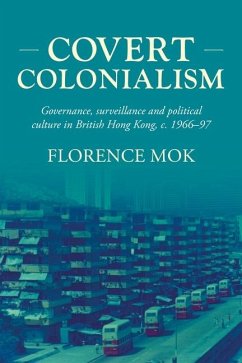This book examines state-society relations in one of Britain's last strategically important colonial dependencies - Hong Kong. Using under-exploited archival evidence, it explores how a reformist colonial administration investigated Chinese political culture, and how activism by social movements in Hong Kong impacted on policymaking. Covert colonialism is framed around the organisational capacity of the colonial state to monitor public opinion, notably through covert polling exercises Town Talk and MOOD. People in Hong Kong had extremely limited democratic rights, but polling exercises constructed 'public opinions' which were used by unelected officials to respond to public needs and minimise social conflict. There were two implications of this shift in colonial governance. On one hand, Town Talk and MOOD provided the colonial government with the organisational capacity to conduct surveillance, monitoring the Chinese society closely: a manifestation of 'covert colonialism' - a strategy to strengthen British control of Hong Kong. On the other hand, these mechanisms indicated that the mentalities of colonial bureaucrats were changing, moving towards a new form of 'decolonisation'. Significantly, covert colonialism allowed ordinary people to take part in the policy formulation process in a state-controlled manner without provoking a hostile response from China. This effort by the colonial government to manage public opinion interacted in complex ways with a diverse variety of Chinese communities engaging with new political movements and generating pro-democratic discourses, leading to changes in political culture. This book provides an innovative long-term perspective of the constitutional crisis in Hong Kong today.








